Top 10 “Most Opened” Blog Posts of 2019: # 4
By Bethel Erickson-Bruce
Right now the perennial question for the Waco Downtown Farmers Market is: WHEN ARE YOU GOING TO MOVE BACK TO THE RIVER? I answer by deflecting, like a good politician. (If you really want the answer to the question of the river, please continue reading about all of the projects related to local food we are actually excited about – the river is addressed at the end).
First off – if you haven’t been to Market since we relocated to the Courthouse, you’re missing out. Yes, it’s hot in summer. But we have more space for more vendors than we did down by the riverside. And much higher visibility than down by the good old riverside.
Second, we started a new thing. Can’t make it on Saturdays to buy groceries? We’ve got you covered. Now you can pre-order through our online store called Market in a Box. We have all the local things – from honey to heavy whipping cream, mini loaves to mushrooms, peaches to purple hull peas. We even have conveniently packaged $15 produce bundles – featuring 1 seasonal fruit and 4-5 seasonal veggies. Think of it as a multi-farm CSA (Community Supported Agriculture) box without a subscription. Through this new online system we are able to work with local producers who are unable to participate at Saturday market – while reducing time expenditure of the producers and increasing everyone’s access to local produce and carefully crafted artisan food goods. We hope to expand to more convenient bundles (like a Breakfast bundle with coffee and breakfast sausage) – and add more items like gristmill grains and bread subscriptions. Take a gander at our current offerings at: http://waco.localfoodmarketplace.com.
Third, we now distribute WIC vouchers to be used for locally grown fresh fruits and vegetables for families currently receiving benefits. Without getting too high up on my political soapbox, let it be known that the amount of fresh produce (or canned) that a family on WIC receives is ridiculous. Like $11 for the month for a family of 2 eligible WIC recipients. (I speak from my personal experience.) Through our partnership with Grow North Texas in Dallas, the Texas Department of Agriculture sponsors $30 in WIC vouchers for each eligible family member. We can only distribute the vouchers once person Market season (defined by TDA as April-October) but as most families know, every dollar counts. As a recovering social worker, I’m delighted by any and all opportunities to increase access to – and affordability of – locally grown fruits and veggies while at the same time supporting livelihoods of the farmers and their families growing our food.
Fourth, the rye bit. If you love the market but: A) can’t wake up early on Saturday or B) can’t remember to place your online order by Monday at noon – we’ve got just the opportunity for you. Join us at Balcones Distilling on Thursday, August 8th from 6-8pm for “Grains & Growers, a farmers market friend-raiser.” It costs $40 but you’ll receive a free cocktail a la Balcones or a mocktail a la Luna Juice. And we have all the tastiest of finger foods from our friends at Milo All Day, Brazos Valley Cheese, Falk Bakery, Heritage Creamery. You’ll also be supporting the work of the Waco Downtown Farmers Market to strengthen our local food system – from the farmers to the folks on a food budget and the friendly faces opening fancy food establishments. Tickets can be purchased through our Square page here: https://squareup.com/store/wdfm.
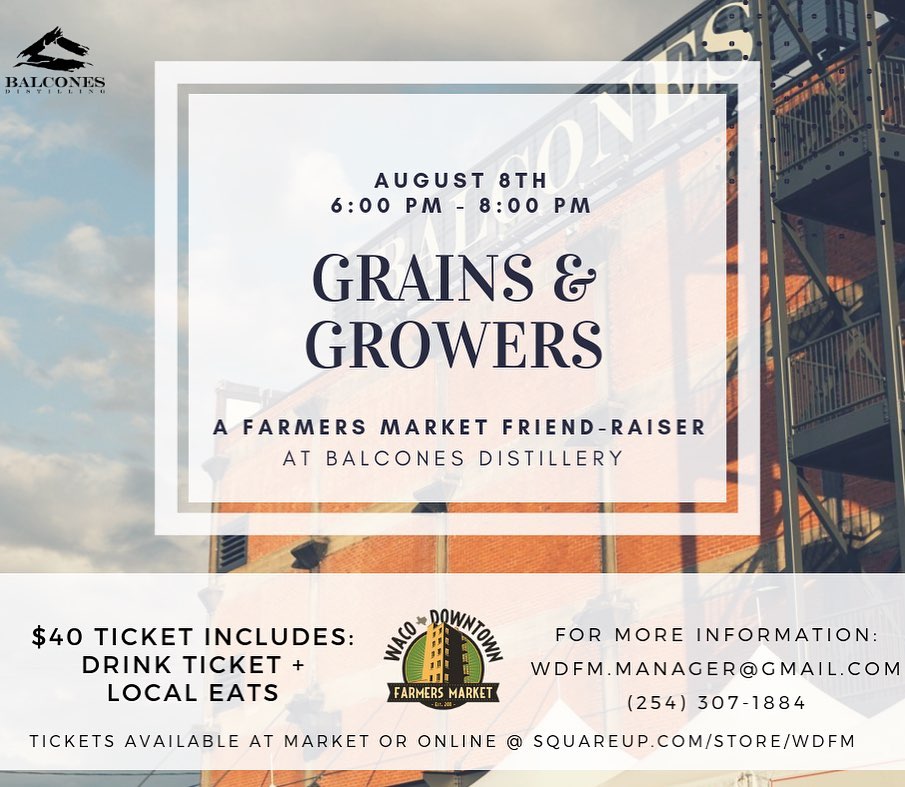
And now for the answer, you’ve all been waiting for – MAYBE IN TWO YEARS. MAYBE NEVER. And you know what, that’s okay. We’ll happily keep running the farmers market each Saturday between the corners of 5th and 6th street in the shadows of the iconic Courthouse and ALICO buildings until some magical, farm-friendly, family-friendly opportunity presents itself.
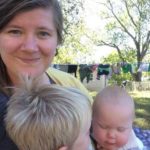
Bethel Erickson-Bruce likes to eat and grow vegetables, run around with her wild little humans – Jasper Jack and Angus Augustus, and star-gaze with her husband (and Rapoport teacher) Jonathan. She also runs the Waco Downtown Farmers Market.
The Act Locally Waco blog publishes posts with a connection to these aspirations for Waco. If you are interested in writing for the Act Locally Waco Blog, please email [email protected] for more information.
By Melissa Mullins
Unless you’ve been living under a rock or in a cave (no judgement if you do), you probably hear quite a bit of talk, at least in the public sphere, about climate change. You may have heard it come up in politics. You may have heard your neighbor say he doesn’t believe in it. You may hear it invoked when there’s threats of bigger, badder weather events. You may, if you are like me, sometimes feel overwhelmed by it all.
The truth is, both government and industry scientists have known for over 50 years that carbon dioxide levels are increasing in our atmosphere, that the increase is due to human activity, and that this will have impacts on the Earth’s climate system*. And most Americans now believe this to be true. Recent research shows that we are not a nation of climate deniers, but we are a nation of climate avoiders. Because we think it’s too big, we can’t do anything about it, we just avoid it. Most Americans don’t discuss global warming with their friends and family, and many reasons are given in surveys for why this is: it doesn’t come up, they think everybody already agrees, or conversely, are not interested in it, it is too political, or people feel like they don’t know enough to talk about it.
How can we avoid avoidance? Michael Smyer suggests that we picture a place that we care about, picture it being affected by climate change or extreme weather as well as how we’d like it to look in 50 years, then think about something we can do NOW to work towards our desired future vision. It’s that last part that’s hard sometimes. One thing that you can do TODAY is register for the Sustainable Waco conference, which will be held Monday August 5th.
The McLennan Community College Sustainability Committee, with support from Waco Friends of Peace-Climate and Baylor University-Center for Reservoir and Aquatic Systems Research, has been hard at work organizing Waco’s first ever community-wide conference on climate and sustainability that is open to everyone, and YOU are invited. Conference organizer Michaela McCown says the reason for having the conference is so that our entire community can become more sustainable. “We want to help people understand that there are lots of things individuals can do, and actions that communities can take, to make a difference in saving money, helping our planet, and making Waco a better place to live.”
The conference is only $15 to attend which includes lunch, and CPE credits are available for educators. Speakers from Waco and other communities in Texas will give presentations on a wide variety of sustainability topics, including recycling, city-wide composting, solar for residential use, of course climate change, and many others. To register, call 254-299-8888 or go to https://cereg.mclennan.edu/ and search “Sustainable Waco”. You can also find the event on Facebook for all the latest updates.
* Check out “Losing Earth: The Decade We Almost Stopped Climate Change” by Nathaniel Rich- it’s at the Waco-McLennan Co. Library, engagingly written, fascinating and infuriating.
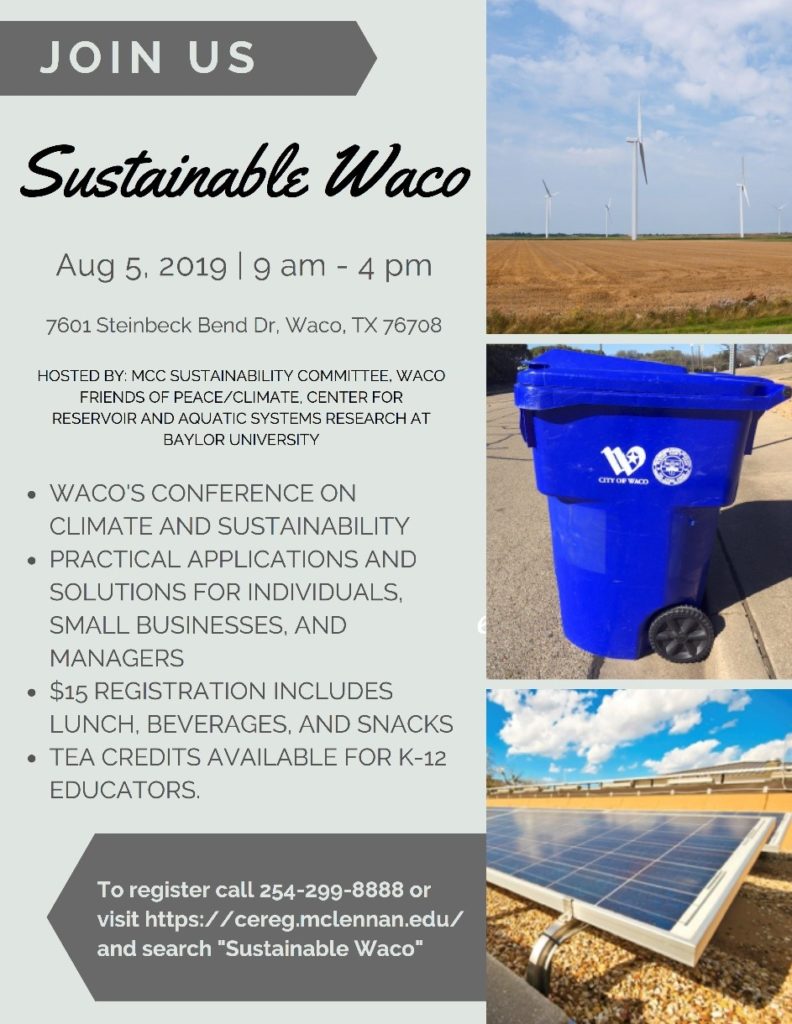
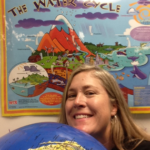
Melissa Mullins coordinates education and outreach at Baylor’s aquatic research center. She serves on the Project WET (Water Education for Teachers) USA Network Council, which has recently developed climate change education resources for K-12 audiences. Water and climate are intricately linked! The views expressed here are solely those of the author.
The Act Locally Waco blog publishes posts with a connection to these aspirations for Waco. If you are interested in writing for the Act Locally Waco Blog, please email [email protected] for more information.
Press release – July 19, 2019 –The United Way of Waco-McLennan County (UWWMC) is pleased to announce its affinity group, Women United, has awarded scholarships to two female graduates from the Adult Literacy and Education Heart of Texas. Both recipients are working mothers pursuing nursing degrees at McLennan Community College.
“Women United mobilizes a diverse network of women in McLennan County to strengthen the community by investing in local programs that enable women to achieve their goals and positively impact their lives,” said Women United Waco Chair Kris Kaiser Olson. “Money raised by Women United through membership dues and fundraising events provides funding to support education scholarships for women.”
Data from the Global Partnership for Education shows educating women has a multiplier effect. According to research, educated women tend to be healthier, earn more income, and provide better health care for themselves their children. These benefits also are transmitted from generation to generation and across communities at large, making women’s education one of the best investments a community can make.
Women United scholarship funds are managed in partnership with the McLennan Community College Foundation. MCC Foundation staff will manage the disbursement of the scholarship funds for the recipients to oversee tuition payment, books, uniform and equipment purchases as needed. Any remainder of the scholarship will be available to the student through an emergency grant application for unexpected barriers.
“This partnership is breaking new ground for us at the MCC Foundation,” said Executive Director Kim Patterson. “Our Adult Education students have shown tremendous perseverance and are perfectly suited to succeed in college. With this new funding from Women United, we can now provide scholarship support for these women, giving them the opportunity to change the social and economic trajectory for their entire family.”
The Adult Education and Literacy program provides English language, math, reading, writing and workforce training instruction to help adult students acquire the skills needed to succeed in the workforce, earn a high school equivalency certificate, and enter and succeed in college or workforce training.
“Attaining your GED as an adult and pursuing college can seem like a daunting task for women already juggling busy lives,” said Adult Education and Literacy Transition Specialist Michelle Telg. “Scholarships like the Women United Scholarships help traditionally underserved students overcome the barriers that keep them from an education to better their lives and the lives of their families.”
As an integral part of UWWMC, Women United is committed to creating an effective female-driven philanthropic force to improve life for women in McLennan County. The Waco Chapter is part of a growing, global network of women leaders, over 70,000 strong across more than 165 communities in six countries.
The work of Women United Waco is aligned with UWWMC’s Impact Framework, by providing women with access to education and job skills training needed to obtain a sustainable job and increase their family’s financial stability and economic status.
Scholarship recipients will also participate in financial literacy training classes taught in partnership with First National Bank of Central Texas. Participants will receive customizable financial literacy training based on their personal needs and financial interests.
For more information about Women United Waco, visit www.UnitedWayWaco.org.
By Carlos Hinojosa
Centering Pregnancy is a fairly new concept that seeks to take prenatal care out of the exam room and into a comfortable and communal setting. It blends regular prenatal visits together with support groups of expecting mothers with similar due dates. Expectant mothers meet for their monthly check-ups, where physicians and nurses facilitate sessions and answer questions that the mothers and their partners have about different aspects of pregnancy. The goals of Centering Pregnancy are to increase the amount of time providers can spend with their patients, improve birth outcomes, help patients build a community of support, and impart a level of knowledge to the patients so they can best care for themselves.
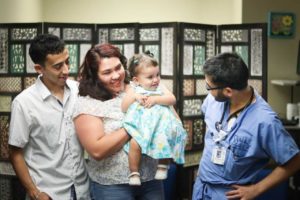
Karla, one of Family Health Center’s patients, recently went through the program herself. Karla has been a patient of Family Health Center since she was born. Her care at FHC actually goes back even further. Her mother was an FHC patient and received her prenatal care here as well, but didn’t experience anything quite like Centering Pregnancy.
When Karla learned she was pregnant, she and her husband were very excited – and a little nervous. There was so much to learn, and neither Karla nor Juan knew quite what to expect. Karla’s doctor talked to her about Family Health Center’s Centering Pregnancy program, and Karla’s mother encouraged her to go. Karla was glad she did. “It was an open and fun way to learn about what was going on inside of me.”
Each meeting, participants gathered in the Centering room at FHC, and one by one, mothers-to -be stepped back into a private area to have their vitals checked and measurements taken to track their progress. After everyone had seen the doctors, the class sessions began. Resources books were issued, and classes featured different activities corresponding to what was happening at that stage of pregnancy. Classes also allowed ample time for questions. “I always had questions, but Juan had even more questions than I did,” Karla said. “You could be sure that if you had a question and were afraid to ask, someone else would ask it.”
The group sessions used the activities to help foster conversation, and those conversations helped everyone get to know each other. Members of each class are encouraged to keep in contact with one another after the classes were over, and Karla has maintained a friendship with one of the members of her group. “It’s nice to know other people who are going through the same things I am, and it helps to be able to talk to someone else.”
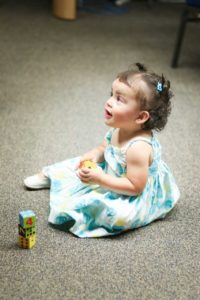
When the time came for Karla to deliver, she felt prepared and confident. She didn’t feel overly nervous, and she thanks the team at FHC for preparing her so well. “Centering Pregnancy taught me all of the things I needed to know before my daughter arrived.”
Centering Pregnancy is just another tool Family Health Center is using to improve the health of our community and make a difference for the families we serve. When asked her thoughts on the program as a whole, Karla said, “It was so great that I tell all my friends who are pregnant to go! The next time I have a baby, I plan to go again.”

Carlos Hinojosa serves as Development Director for Family Health Center in Waco. He holds a bachelor’s and master’s degree from University of Mary Hardin-Baylor and has been living in Waco for 18 years. When not at work, Carlos loves to spend time with his wife and two sons taking walks, making up silly games, and perfecting the art of dad jokes.
The Act Locally Waco blog publishes posts with a connection to these aspirations for Waco. If you are interested in writing for the Act Locally Waco Blog, please email [email protected] for more information.
By Jennifer Branch
Talent. It is the top need of employers across the country. Texas and Waco are no exceptions, especially with historically low unemployment rates.
As the “baby boomer” generation continues to age and exit the workforce, employers are becoming more and more desperate for adequately trained workers. The growth of a competitive economy and rapid advances in technology have changed the face of the job market and we as a community must answer.
The Heart of Texas P-20 Council is a school-to-work initiative that builds pathways from education to workplace to provide a skilled workforce. Our mission is to create collaborative partnerships that connect students to both college and career readiness. The council has historically had a strong presence of collaboration from educators, but the missing link remained – industry feedback.
My work with the Greater Waco Chamber of Commerce has been incredible. I have the pleasure of sitting down face-to-face with local employers throughout McLennan County and learning more about their businesses and the dreams and passions that led them to their line of work. I am often invited to celebrate successes, but I am also challenged with partnering with businesses to overcome issues they are facing. Ninety-five percent of the time, the greatest challenge our local businesses face is recruiting and maintaining Talent and Workforce. They often face growth restraints due to the lack of qualified workers. Markets are hot, products and services are in demand, but businesses simply cannot accommodate all requests because they do not have capacity. If they had the qualified, trained employees they need, they could more closely meet the demands.
The feedback from my visits is aggregated and collectively shared with educators, curriculum planners and community leaders. Allowing the first-hand transfer of information about the specific skills and needs the employers are looking for has helped the P-20 Council’s overall local mission and commitment as well as supported the state’s 60×30 strategic plan for preparing students for the workforce. The newly launched Talent Portal www.WacoTXJobs.com and the ongoing, strategic relationship with the US Army’s Fort Hood Soldier for Life Transition Assistance Program are other examples of workforce initiatives I focus on as well as continuing to support our local industry and community partners.
One thing that I have seen that is most encouraging and fascinates other economic developers is the collaborations within our community. Waco has brought to the table City and County officials, regional early-ed public and private schools, leaders from TSTC, Baylor University, McLennan Community College, Texas Tech University at Waco, Tarleton State University – Waco, Workforce Development Boards and other community and industry leaders, literally all focused on the same end goal.
While change certainly is underway in our community to develop a robust talent pipeline for employers and to give job seekers more and clearer options and career pathways, we must continue to collaborate and push for continued change. A healthy economy and job market lead to healthy communities, which lead to healthy businesses and healthy families. The bottom line is that there is no growth without talent. Partnerships that nurture, grow and diversify the talent pipeline are vital and partners in McLennan County should be proud of the work started.
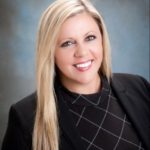
Jennifer Branch serves as the Director of Existing Industries and Workforce Development on the Economic Development Team at the Greater Waco Chamber. She is also on the Workforce Development Board as the Co-Chair for the Texas Economic Development Council. She relocated from Dallas to Waco 10 years ago and is settled in China Spring with her two daughters. In her “free” time she enjoys all things outdoors, especially on the lake or one of the rivers flowing through our city center. Along with being an ambassador for our community, she is also an active advocate for many non-profits for which she has a passion.
The Act Locally Waco blog publishes posts with a connection to these aspirations for Waco. If you are interested in writing for the Act Locally Waco Blog, please email [email protected] for more information.
By Brittany Fitz-Chapman
After over a year of planning, surveying, and understanding, the 2018-2019 Community Health Needs Assessment (CHNA) for Waco-McLennan County is complete and ready to use. Now, I can hear everyone taking a collective sigh as another person from Prosper Waco talks about the importance of data…again. However, the way our community collectively comes together to understand the growing health needs of all residents is unique and should be celebrated.
Since early last year, members of the cross-organizational CHNA task force have met on a regular basis to discuss the specifics of the survey conducted every three years. The goal of the CHNA is to provide a comprehensive and unbiased profile of McLennan County, assess community health and risk factors, and identify access to care issues. Because our community is a part of the City Health Dashboard project, the group concentrated on collecting information beyond just descriptive characteristics like an individual’s height and weight.
This year’s CHNA focused on collecting information that is actionable by the various organizations, coalitions, and workgroups working to improve the health outcomes of residents of McLennan County. This means that every piece of information collected will be used to improve the health outcomes in our community. Having this data allows targeted action plans to be created to make the largest impact possible.
For example, the study found that more than 20% of respondents in Waco-McLennan County do no physical activity during a typical week. We also know anecdotally that there are limitations to how and when individuals find time to exercise. With this information in hand, one of our working groups, “Live Well Waco” is taking up that cause through their Worksite Wellness Program. In partnership with the Waco-McLennan County Public Health District, Live Well Waco is working to identify and recognize local organizations and businesses who take steps to improve the health of their employees. This program is just one piece of the puzzle, but helping employers understand the importance of a healthy workforce and helping employees get active goes a long way in our community’s overall well-being.
This result and others will continue to stimulate discussion and planning of projects to address identified health needs. Balancing the data collected with first-hand knowledge and experience will yield the best results for our community. Previous assessments have resulted in targeted health promotions and have supported numerous grant opportunities for the community.
Various community organizations participated in a taskforce to help develop the assessment including Baylor Scott White Medical Center-Hillcrest, Family Health Center, Heart of Texas Mental Health Mental Retardation, Heart of Texas Regional Advisory Council, McLennan County, Prosper Waco, Ascension Providence, and Waco-McLennan County Public Health District.
The CHNA was funded through a collaboration among the Waco-McLennan County Public Health District, Ascension Providence, Baylor Scott & White Health Medical Center-Hillcrest, Family Health Center, Prosper Waco, and Baylor University’s Center for Community Research and Development.
You can find a copy of the full report on Prosper Waco’s “Research” page or visit the pages of one of our partners. And as always, if you have any questions about the report or the data, please reach out to me at [email protected].
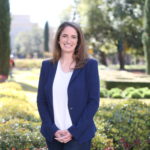
Brittany Fitz-Chapman works at Prosper Waco as the Director of Data and Research. She is a graduate of Baylor University. She holds two master’s degrees and is pursuing her PhD in Sociology at Baylor. She has engaged in community research in Waco and has published professional articles about what makes communities strong. She enjoys exploring Waco with her husband and their two puppies!
The Act Locally Waco blog publishes posts with a connection to these aspirations for Waco. If you are interested in writing for the Act Locally Waco Blog, please email [email protected] for more information.
Top 10 “Most Opened” Blog Posts of 2019: # 3
By Reyna Reyes
I was always that kid. The one who was in everything, or at least tried to be. I guess it’s always been that way with me. I’ve always been very passionate and 100 percent all in.
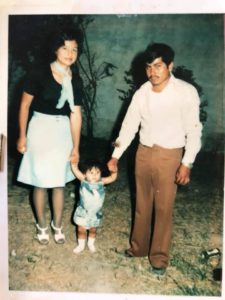
My parents brought me here to the US in 1979, I was a 3- year old toddler. Early on into my pre-teens, we visited Mexico often.
I always knew to prepare because the walls at my grandparents were see-through, dirt blew everywhere, with dirt floors, a random concrete slab, no electricity, no running water, and no bathroom. Still is the same today.
It was always amazing to me how a family of 8 could cramp into one room with a couple of mattresses on the dirt floor and manage to cook and eat outside in the elements.
We stopped going as frequently as crime with the cartels increased and it was no longer safe for us to go to “la frontera.”
I would hear my uncles talk about the dangers the family faced and how us visiting there could make it a greater risk for them.
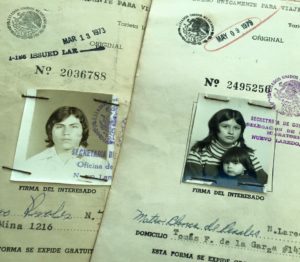
Ten years ago, my husband and I were quickly ushered back by family across the US border when we attempted to go to my cousin’s funeral in Mexico. We were warned by family that tensions were high, and we would be at risk for danger.
My grandfather passed away and we were advised to stay away.
My uncle passed away and more of the same.
Over the years, my family, like many others, has suffered loss due to the crime that has gone on unchecked at la frontera. Daily living is sometimes near impossible without becoming a casualty of the war on the streets.
Bloodied bodies across the front page of the local paper serve as notice to families, including mine.
I am so grateful my parents immigrated to the US. And while there is definitely a desperation in Mexico and further South, and a very real humanitarian crisis at the border; most Mexicans can appreciate the efforts of the US administration to keep this country safe.
My cousin, a professor at a school in Mexico expressed to me how they wish their leaders would do the same on their behalf.
Personally, growing up in the US as a Mexican immigrant, I was often stereotyped and racially attacked.
I was called a wetback and was often bullied in school because of it.
It could have been because I was that girl who wore the folclórico dresses and sang the Tejano songs with a conjunto band and the Mariachi Band at school.
It didn’t help that most of my friends were teachers and administrators, and I often sold tamales to them to help mom with money.
As a result, I was often pushed around and ridiculed.
But it wasn’t by who you may suspect.
It wasn’t those “racist white people” who hated Mexicans as I often hear about today…I didn’t meet any of those people and didn’t really hear about them back then that I can remember.
No. My attackers were the very same Latino kids who are now adults who continue to do the very same thing to folks, including me; except using today’s platform that is now social media.
I was very recently publicly stereotyped and attacked. I was called an ignorant whitewashed entitled chicana by an immigrant advocate.
A community member mocks me with memes and uses bullying tactics online to try and intimidate me, as recently as today.
I think it to be completely ironic.
It takes me back to those days in middle school and high school when we often had little to eat, no electricity or running water, and were often on the verge of being evicted; dealing with an alcoholic for a father, protecting my younger brother from seeing his state, dealing with my epilepsy (We didn’t always have the money for the meds or specialist visits, not to mention money for a translator and transportation), and still working to keep my grades up in school to ensure my mother’s sacrifice did not go in vain.
As a conservative Latina, I am often accused of being a traitor.
If leaving my home country to make a better life here is being a traitor, then maybe I am. Although I didn’t choose my path as a child, I guess I could have returned to Mexico to make it work.
If I’m a traitor because I didn’t go back to fight so that the Mexican government would do for its citizens as it should, then maybe I am. I guess it depends on how you define it.
But if that is why I am a traitor, then would it make hundreds of thousands of Mexican immigrants traitors because they didn’t stay to fight the corruption in their homelands?
No. Of course we are not traitors. No matter where we stand politically. We have all fled and continue to flee countries who have cared little for their own citizens.
We are here because the US government’s structure allows for freedom and opportunities.
I was naturalized very recently as a US Citizen and I am scheduled to attend a swearing in ceremony in a couple of months. I couldn’t be more excited.
Let us stop attacking the leaders of this great nation. Let us stop playing into the media for ratings and politicians for the vote.
Instead, let us join forces to focus on immigration reform and raise money to help manage the efforts at the border and help organizations that are on the front lines working to help families reunite.
Let’s join forces to raise money to cover attorney fees and legal processes for those seeking asylum and a path to citizenship.
Let us raise money to send US ambassadors to Mexico to work on a solution to address the root cause of the crisis.
Let’s work together to address this very real crisis affecting very real families. Some who may be our very own.
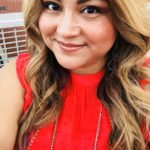
Reyna Reyes is a 40-year Wacoan. She is a first generation Mexican immigrant and a first generation high school graduate. She is a Licensed Vocational Nurse with an Associate’s degree from McLennan Community College and a Bachelor Degree from Tarleton State University in Business Management. She co-chaired Care Net Waco’s very first Style Show fundraiser last year featuring Care Net moms and their children, an organization very near and dear to her heart.
She is a not-so-anonymous shopaholic who loves to shop the locals and encourage her social media followers to do the same. She is 22 years married to her amazing husband, Joshua and they have a 10-year old son, Jordan. They enjoy watching Baylor Football and Lady Bears Basketball together.
The Act Locally Waco blog publishes posts with a connection to these aspirations for Waco. If you are interested in writing for the Act Locally Waco Blog, please email [email protected] for more information.
Top 10 “Most Opened” Blog Posts of 2019: # 9
Is your child looking for something to do this summer? Why not encourage him/her to write and illustrate a novel? That’s What Kamayah Miles did!

Kamayah Miles is 9 years old and will be a 5th grader at Connally Elementary. She developed a love for writing at the age of 5. Kamayah’s other hobbies are drawing, arts/crafts, reading and baking cookies with her mom. She dreams of being an author and a chef.
We have some pretty amazing young people in our community! Here is Kamayah’s novel: Runaway Rockstar! Read it now so you can say…”I knew her when…” Thanks for sharing your work with us, Kamayah! We are proud of you!
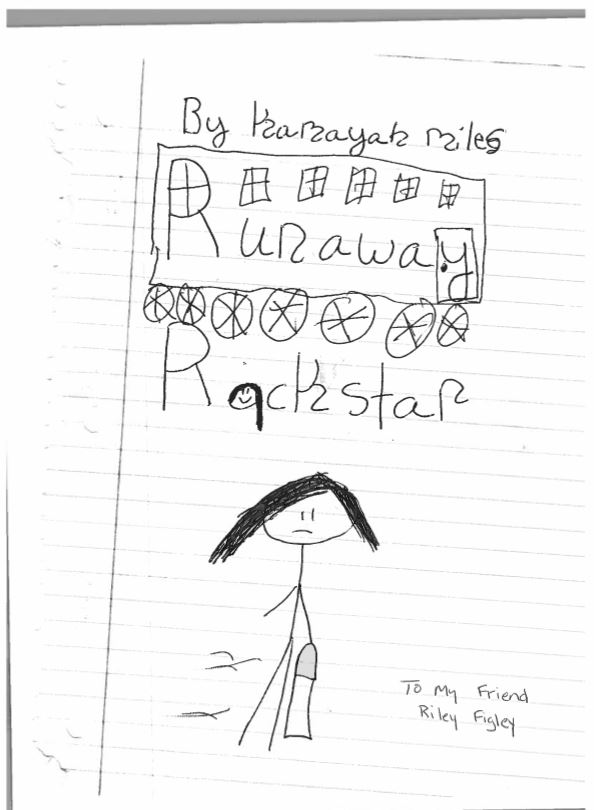
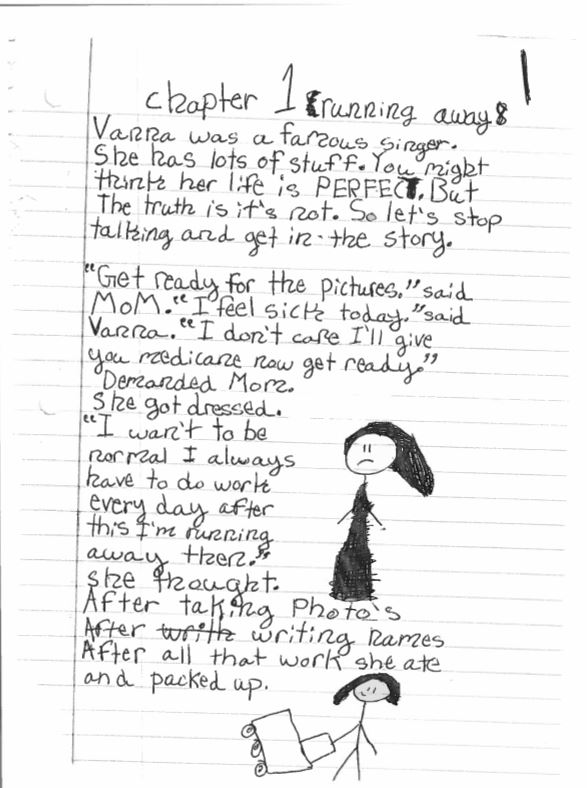
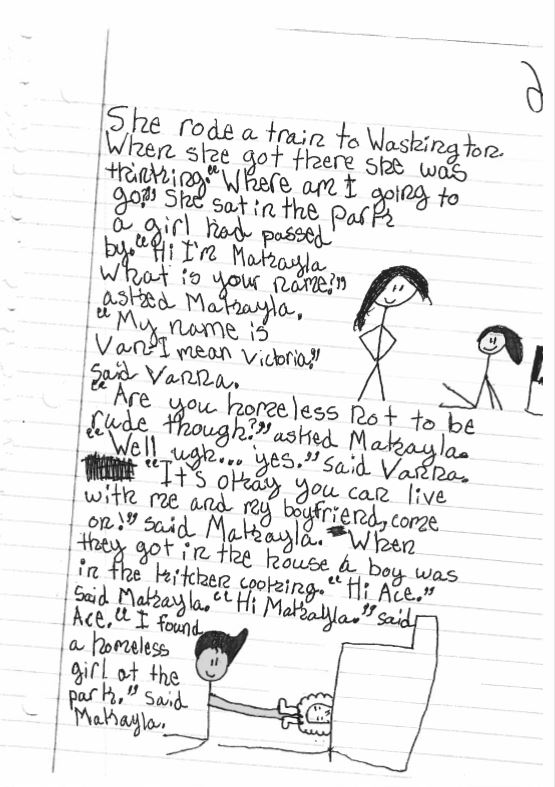
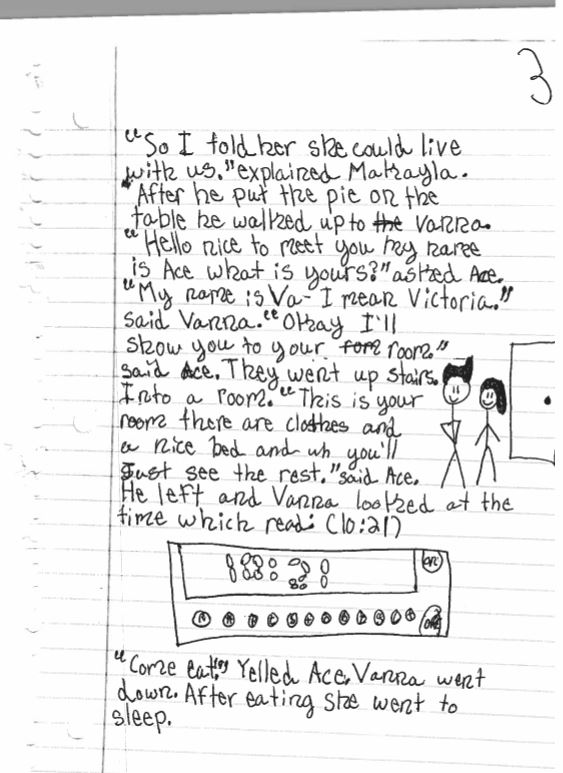
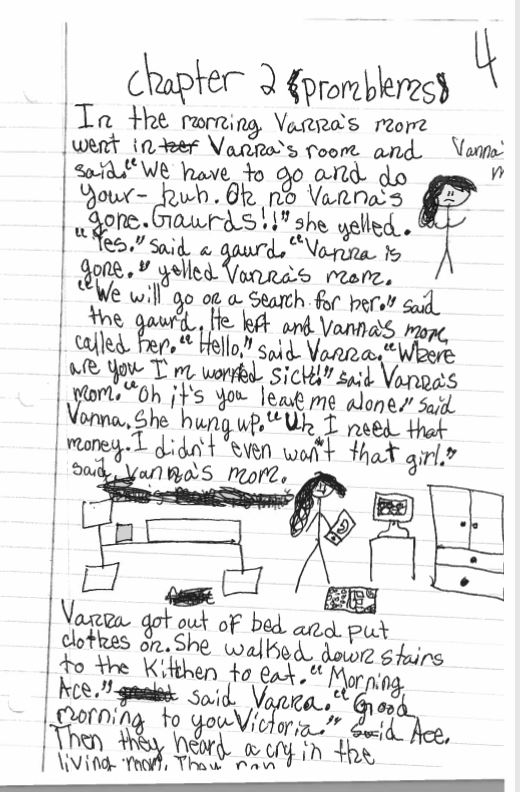
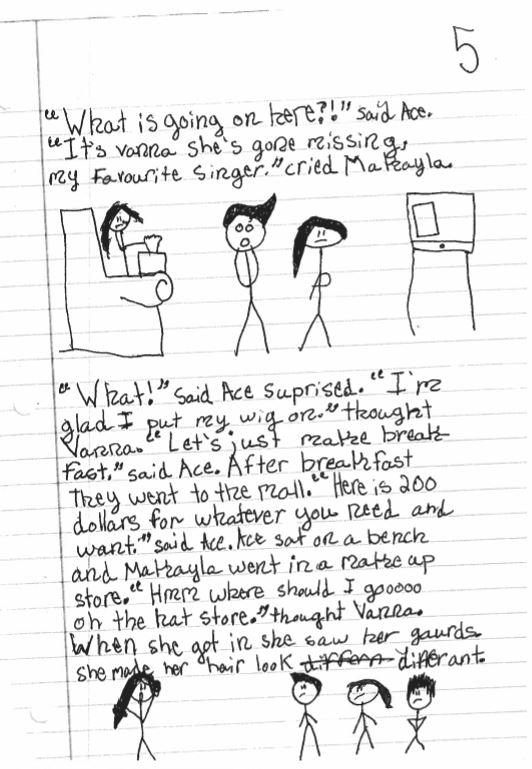
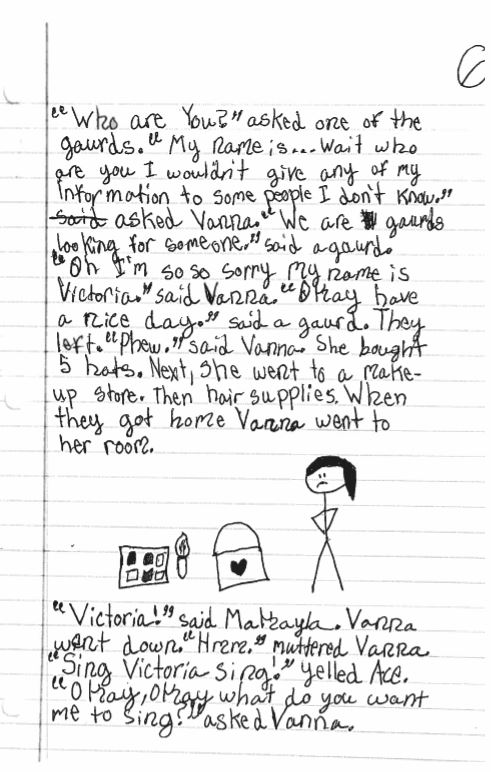
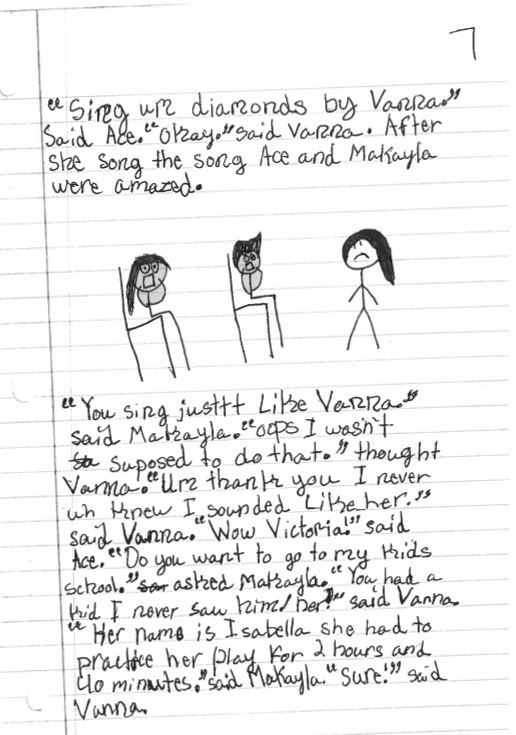
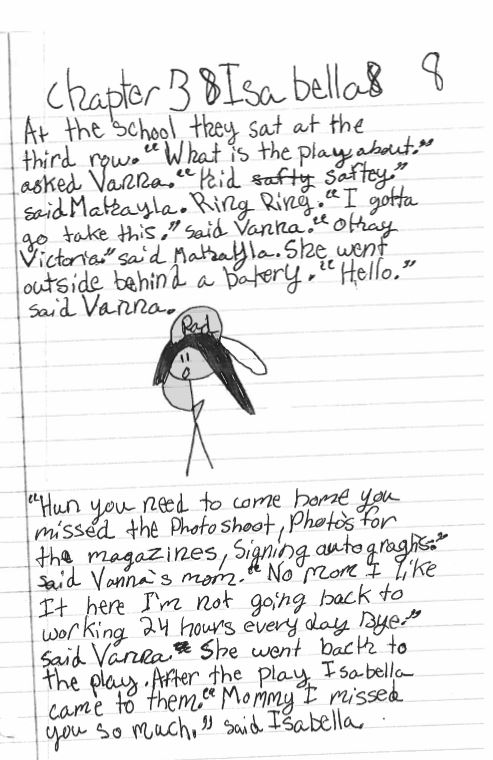
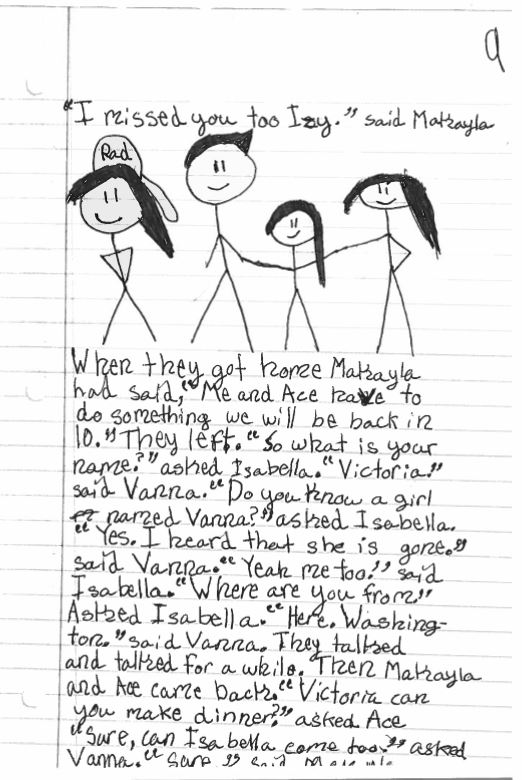
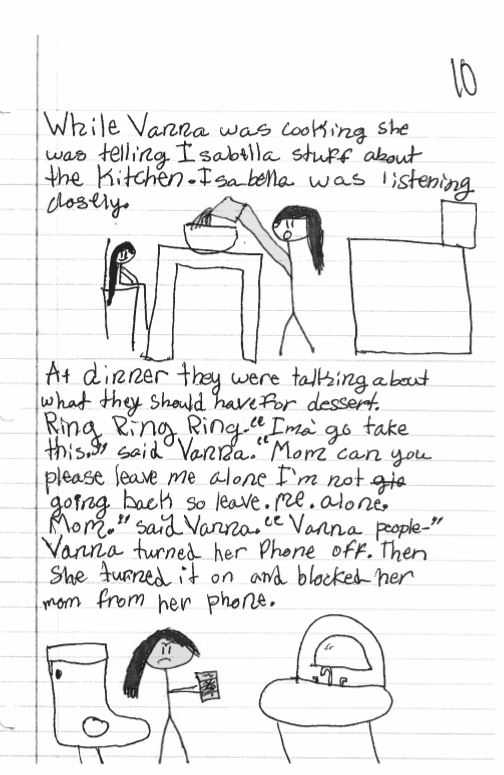
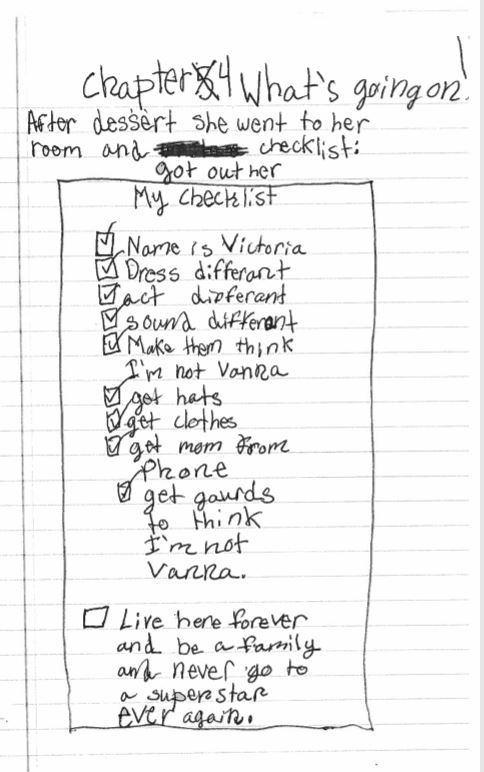
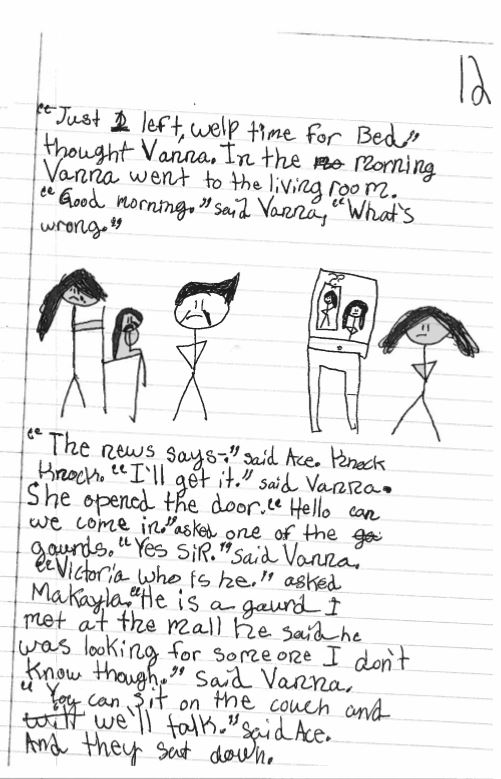
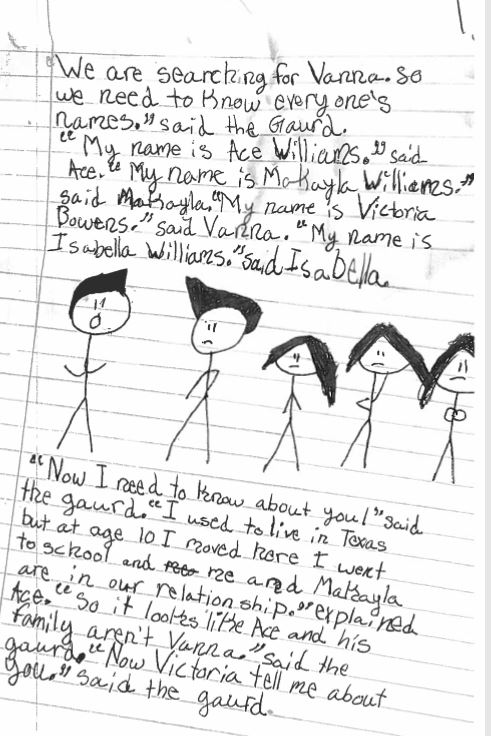
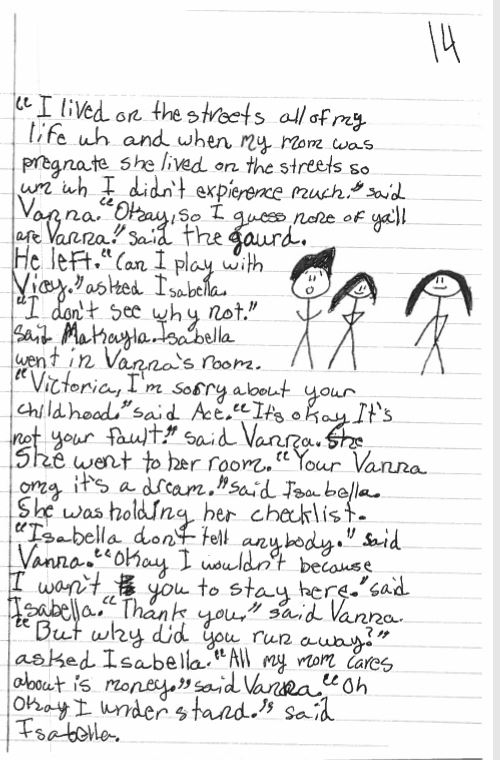
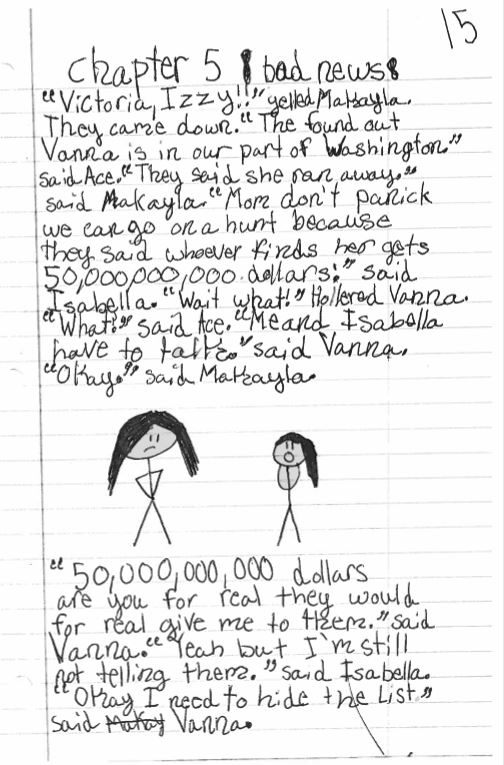
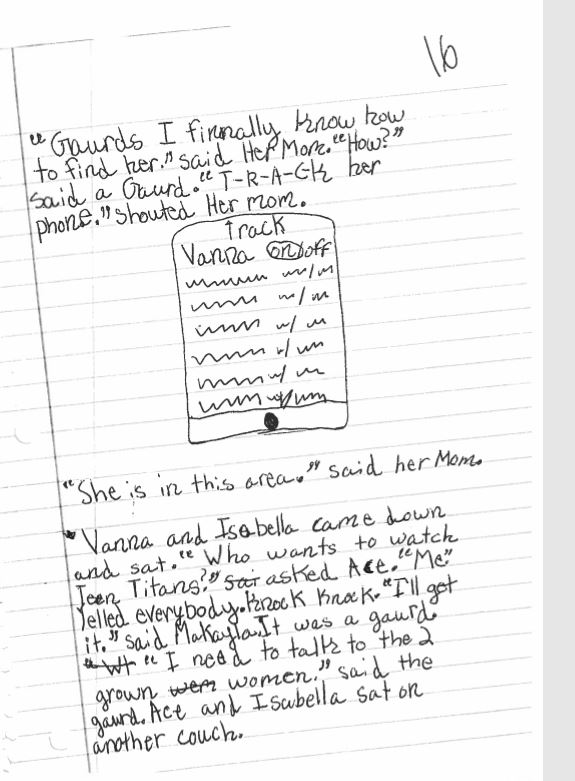
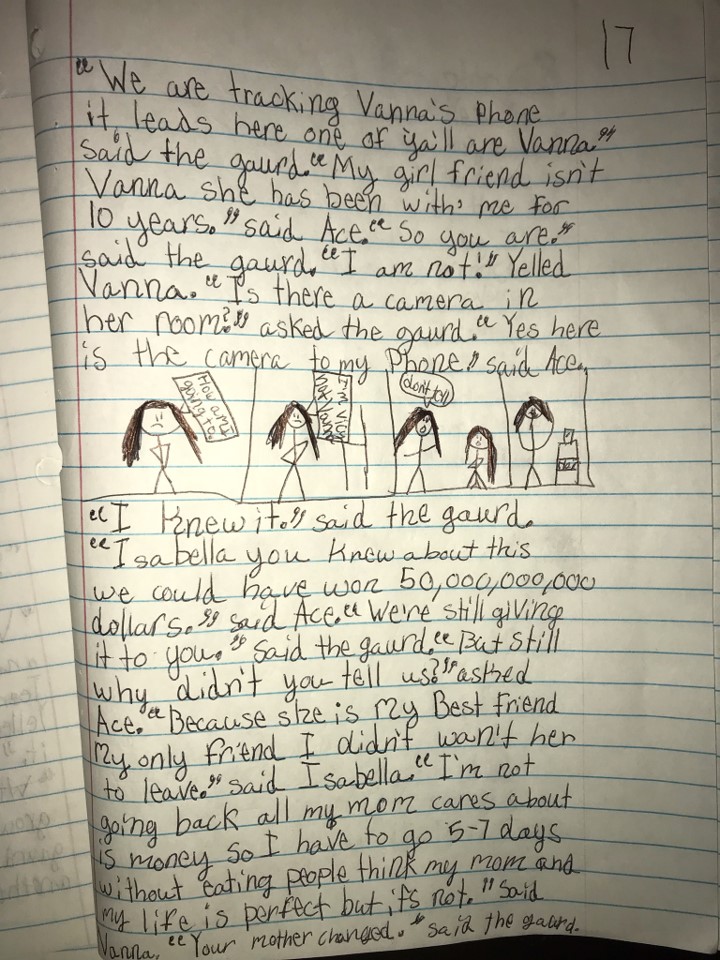
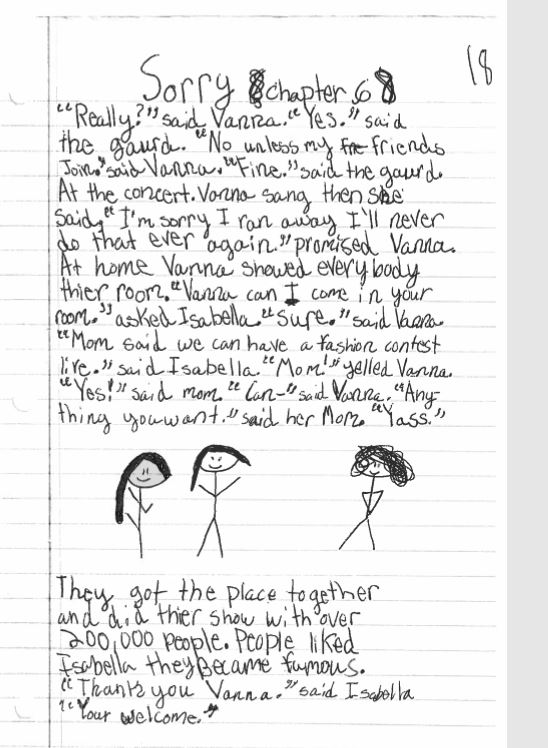

By Kennedy Sam
In summer of 2018, through a partnership with Creative Waco, Waco ISD, Prosper Waco’s summer intern program, and generous local sponsors, ARTPrenticeship was brought to life. Ten rising seniors from Waco ISD gained real-world, concept-to-completion, mentored work experience and created the mural “1000 Hopes for Waco” in the process.
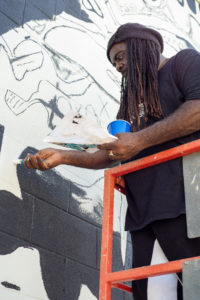
This summer, we are back for year two — but this time with two walls. Similar to last year, we’ve hired 12 apprentices from Waco ISD and six local professional artists serving as the creative team guiding the apprentices. One new addition to this year’s program is well-known New Orleans artist and muralist, Richard C. Thomas, serving as a teaching artist and lead designer on one of the murals.
Thomas’ work graces the New Orleans International Airport, an Iowan mural dedicated to immigration, 20th anniversary posters for the New Orleans Jazz & Heritage Festival, and on the walls at Waco’s own Kieran-Sistrunk Fine Art Gallery during the month of July.
You can find the murals in-progress at Brotherwell Brewing and the Family Health Center’s Martin Luther King Jr. Community Clinic.
We want to get the Waco community involved as much as possible, so we invite you to Community Paint Days! Join our apprentices and creative team for the morning to paint and learn more about their experiences working with ARTPrenticeship, plus get a sneak peak of the designs. No experience needed, just come out and support our young creatives as they make their mark!
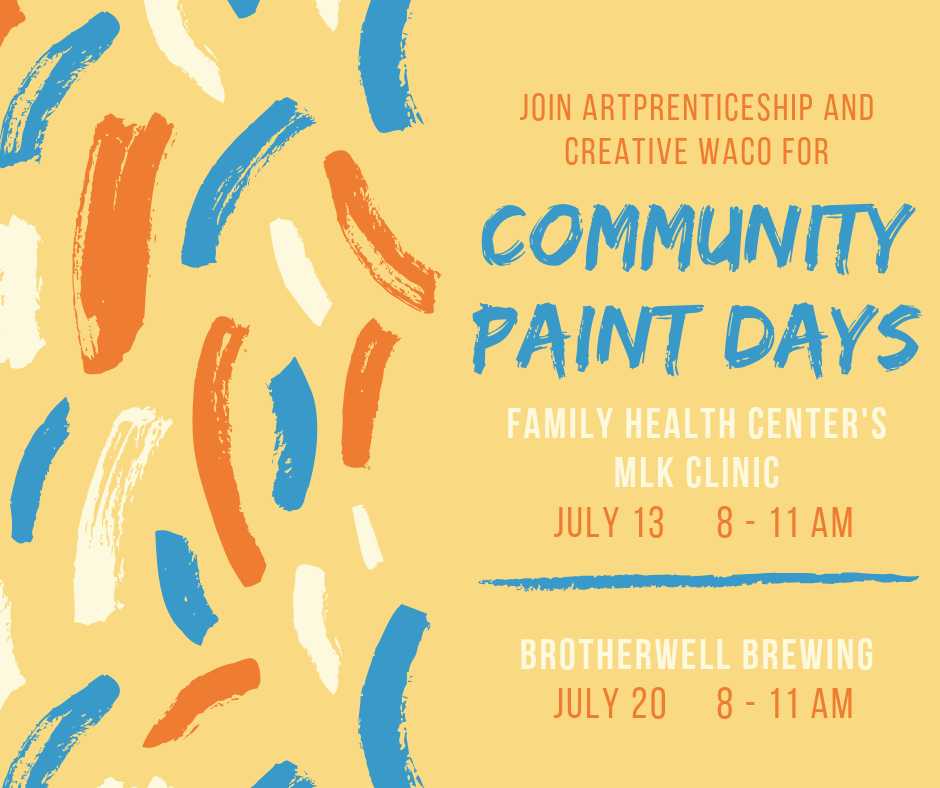
Family Health Center – MLK Jr. Clinic
July 13, 8 – 11 a.m.
July 20, 8 – 11 a.m.
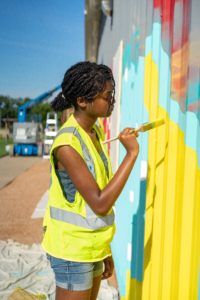
I sat down with two apprentices to hear about their experience thus far as a part of ARTPrenticeship 2019 program. Kaeleana Ramirez is a rising junior at University High School working with the mural team at the Family Health Center’s Martin Luther King Jr. clinic. Upon completing high school, she plans to attend college on the west coast or in Hawaii to study marine biology. Lillian Olvera is a recent graduate from University High School working with the mural team at Brotherwell Brewing. She plans to continue her education at McLennan Community College to study art.
What made you interested in applying for the ARTPrenticeship program this year?
Kaeleana: I love art! I’ve been taking advanced art classes since middle school. This upcoming year I’m moving up to Pre-AP Art, so when I heard of this program I had to apply.
Lillian: I actually wanted to participate in the program last year, but it didn’t work out. This year I came to the information session about the program at University and decided to apply. This is my first job, so I thought this would be a great opportunity do so something I’m passionate about and gain work experience.
How have you enjoyed working alongside the teaching artists?
K: I’ve definitely enjoyed working alongside the teaching artists. I knew there were artists in town but I thought they typically focus on creating work that would go in a gallery, not dedicating their time to help teach high school apprentices how to paint murals.
L: This has been a fun experience and it’s cool seeing professional artists in our community. I’m mostly familiar with our art teachers who are professional artists too, but it’s interesting seeing and getting to work with people who are full time artists.
What were some of the goals that you set during the studio sessions for this summer? Do you feel like you’re on track to hit those goals?
K: The main goal was to broaden my horizon. Usually I create small projects like painting on canvases or spray painting, but I wanted to learn more ways to improve on my techniques. I also wanted to work on being less critical of my work. ARTPrenticeship has definitely taught me a lot about the creative process.
L: A few of my goals that I identified were to be able to work with the group full of other creatives, learn how to manage a project of this magnitude from concept to completion, down to how plan out a budget. I’ve definitely learned all of that and more.
Has working on a creative project like ARTPrenticeship impacted the type of working environment or career path you aspire to work in?
K: In general, it’s taught me a lot about working with a group and how to manage working alongside other people’s personalities. Although I don’t plan to go into the creative field, however, there are some creative qualities that will help me be successful.
L: My dream is to open up a studio like Marvel or Disney that focuses on design, animation, and fashion. This program has taught me some invaluable things that would help me create my studio and I’ve met a few people who want to help me attain that goal.
What has been one of the greatest lessons that you will take with you in the future?
K: There’s a lot! Learning how to work as a group, a part of a whole instead of as an individual has been an interesting lesson. We’ve learned how to work in different parts or sections but still communicate different ideas in a professional environment.
L: I’ve learned that it’s ok to make mistakes. You rarely get something right the first time, so sometimes you need to step away then come back with a clear mind. It’s all a part of the creative process.
To learn more about ARTPrenticeship visit us at creativewaco.org/artprenticeship.

Kennedy Sam is the Director of Marketing and Communications for Creative Waco, McLennan County’s arts agency. As a longtime Waco resident, upon receiving her degree from Louisiana State University was excited to return to her hometown to begin her career serving the community she loves. In her spare time, she enjoys rediscovering all that Waco has to offer and exploring the many walking trails with her pup Bleu.
The Act Locally Waco blog publishes posts with a connection to these aspirations for Waco. If you are interested in writing for the Act Locally Waco Blog, please email [email protected] for more information.
InSite is a “creative placemaking” initiative in Waco, Texas. Creative placemaking uses the arts and design as tools for transforming communities, strengthening local identity, and leading social change. Right now, they are focusing on theatre production, but they plan to offer arts education programming for kids and adults, and opportunities to get involved in public and pop-up art and other projects!
Their current project is a series of three “Shakespeare Studios.” Each studio will include a collection of scenes, sonnets, and soliloquies focused on a theme. The first of these studios “Love and War” will be presented July 16 at Brotherwell Brewing.
In today’s post a local high school student shares her excitement about finding an opportunity to indulge her love of Shakespeare. – ABT
By Zoë Seagle
I have been acting in Shakespearean plays since I was eight years old. I was a part of a homeschool co-op that performed yearly at the Scarborough Renaissance Festival in Waxahachie. I remember watching the older kids performing their main roles, delivering their monologues, and delving into their characters to the point that they weren’t themselves anymore. I could only dream! I was this very tiny, very homeschooled, terrified kid. The first time someone introduced themselves to me, I screamed and ran behind a couch for protection. (I stayed there, crying, for a good hour.) My director at the time, Tracey Villanueva, swore she would break me out of my shell. I was not pleased with her determination, but I don’t know where I would be if she had not seen through my walls.
You
know the cliché poster in the child’s room of their idol? Well, Shakespeare was
the guy on my wall. I was fascinated with his work and lifestyle. I mean, he
made 2000+ words up and over 30+ plays! That’s creativity at its finest.
Two
years ago, I enrolled in a public high school, and sadly that ended my performances
in the Scarborough Fair. Not having my yearly dose of Shakespeare was strange.
I searched for a group during those two Shakespeare-dry years that performed or
studied Shakespeare plays in Waco, but no such luck. I did manage to find
Jubilee Theatre, though, the small, tight-knit group I soon called home.
Jubilee’s director, Trent Sutton, blew my mind with his actor-focused plays. It
was like nothing I’d ever been a part of before. When he told me about how he
was transitioning to InSite, a growing theatre organization taking a huge
interest in Shakespeare, I was absolutely thrilled! A group that would give me
my yearly dose of Shakespeare and have one of the best directors I’ve ever had?
Consider me family!
Since following Trent to Insight, I have met Luann Jennings, the founder of InSite, and Stefanie Wheat-Johnson, who both have very mesmerizing ways of directing. I’m excited to watch InSite grow and become something absolutely amazing for Waco. So, keep an eye out for our productions and spread the word about InSite to your friends and family! Look out Waco, because here we come!

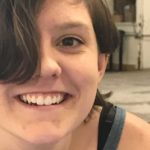
Zoë Seagle is an 11th grade student at Rapoport Academy. She loves to perform, play music, and write when she isn’t at school. She has been singing and acting for many years now, and hopes to continue to do so in the future.
